- Учителю
- Урок по английскому языку в 8 классе: 'Ты всегда понимаешь, что говорят другие люди?'
Урок по английскому языку в 8 классе: 'Ты всегда понимаешь, что говорят другие люди?'
Do you always understand what other people say?
(8 класс)
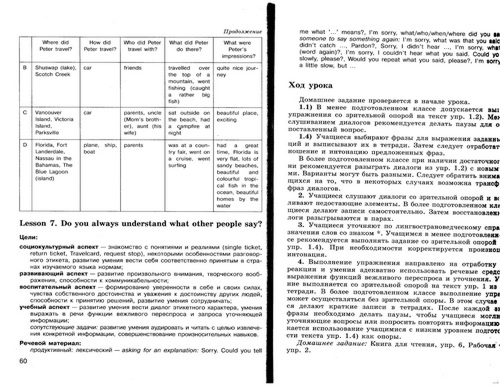
Stages
Ход урока
I Introduction. Организационный момент. Сообщение темы и целей урока Слайд 1
- Good morning, dear friends!
-Good morning, teacher!
-I am glad to see you!
-We are glad to see you, too!
- Who is on duty today?
- I am on duty today
- What day is it today?
- Today is the 4 th of December
- Who is absent today?
- All are present
- Thank you very much! Sit down, please!
- Today you will learn how to communicate with people if you travel abroad. You will listen to different people and learn how to ask for information.
II Phonetic activity. Фонетическая разминка Слайд 2
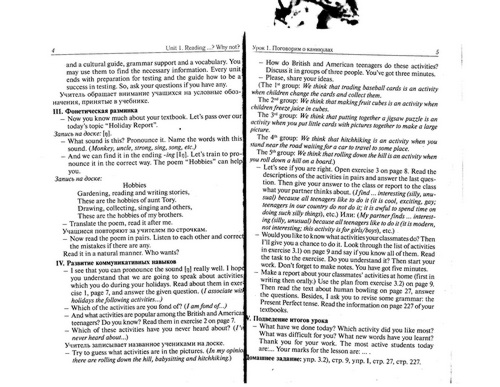
III Warming - up activity. Речевая разминка Слайд № 3
-
Look at the blackboard and answer the questions, please.Посмотрите на доску и ответьте на вопросы.
-
Do you abroad on holidays?
-
What is your favourite holiday destination?
-
Do your parents always discuss with you where to go on holidays?
-
Do your parents always visit travel agencies?
-
Do you usually buy a package holiday or travel on your own?
-
What holiday accommodation do you prefer?
-
Do you like going on excursions with an organized group?
-
What is your favourite way of travelling?
IV Lexical activity. Работа с лексическими единицами. Ex.6 p.40 AB Слайд 4
1.There are many proverbs about travelling. Find the other half of these English proverbs.
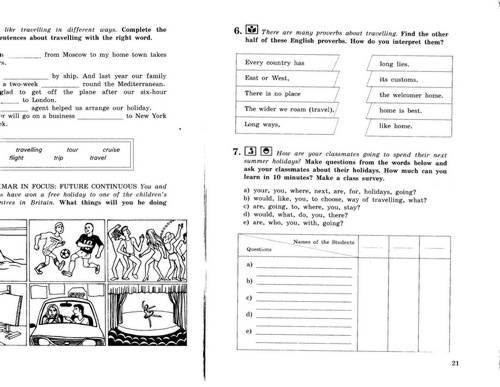
2.Fill in the gaps in the following sentences with an appropriate word from the box. Слайд №5
Ex 4 p 40 AB
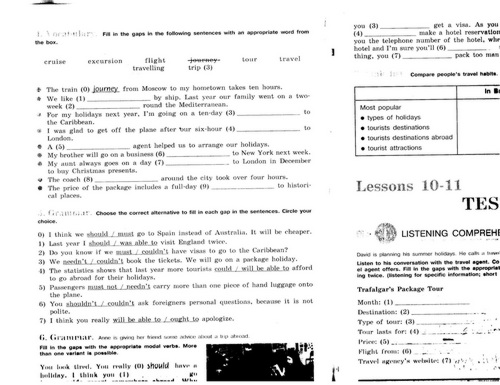
V Grammar. Ex.2 p.34 AB Слайд №6 -8
While travelling abroad you could come across some signs. Make captions.
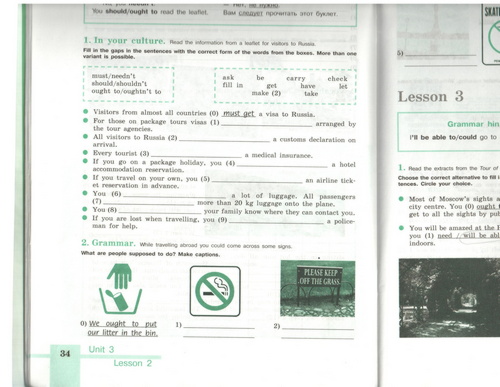
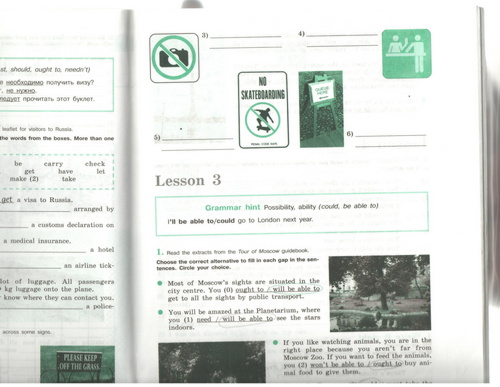
VI Listening/Reading for details Работа с текстом диалога. Ex.1 p. 83 Слайд №9
Pre - listening activities. Turn over the page, please. Look at the pictures in ex.1. Travelling abroad is not only visiting tourist attractions. It is also a good chance to meet people.Это также хороший способ познакомиться с людьми. Listen to some conversations where the tourists are. Прослушайте несколько диалогов о туристах.
Find out how they … Выясните как они …
-
ask to explain the meaning of the word. Просят объяснить значение слова.
-
ask to say something again. Просят повторить что - нибудь снова.
-
Listening
-
Post - listening activities.
Answer the questions given before listening.
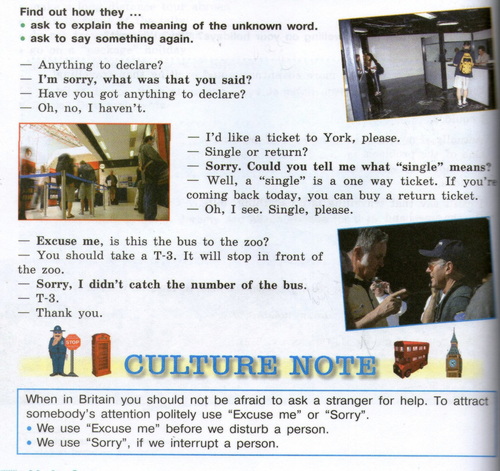
VII Работа с текстом в разделе "Cultural note" Слайд №10
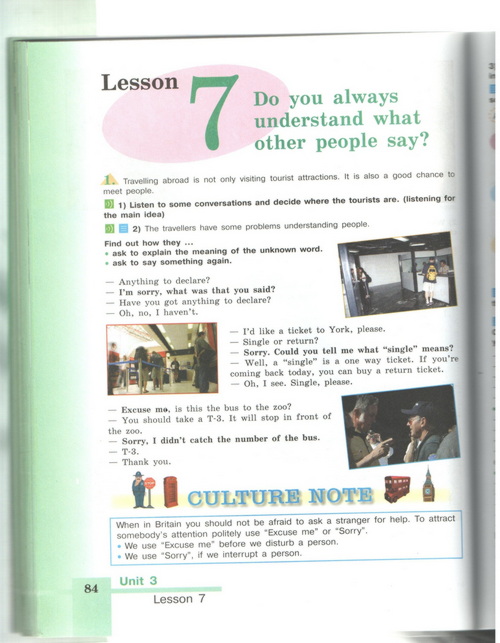
VIII In your culture. Ex.13) p 85 What are some other ways to ask people for an explanation or to say something again?Какие существует другие способы попросить людей объяснить что - нибудь или переспросить? Make two lists. Составьте два списка.
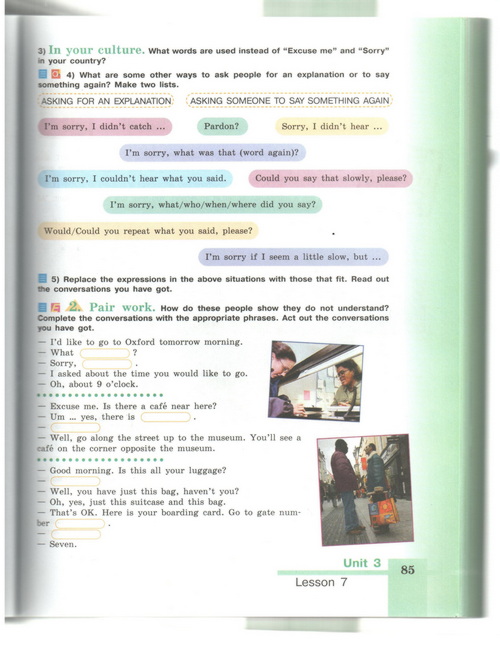
Слайд 11
IX Pair work. Работа в парах. Тренировка навыков говорения ex.2 p.85
Complete the conversations with the appropriate phrases.Дополните диалоги подходящими фразами. Act out the conversations. Разыграйте диалоги.
1) - I'd like to go to Oxford tomorrow morning.
-What …?
-Sorry, …
- I asked about the time you would like to go.
-Oh, about 9 o'clock.
2) - Excuse me. Is there a café near here?
- Um… yes, there is…
- …
-Well, go along the street up to the museum. You'll see a café on the corner opposite the museum.
3) - Good morning. Is this all your luggage?
- …
- Well, you have just this bag, haven't you?
- Oh, yes, just this suitcase and this bag.
- That's OK. Here is your boarding card. Go to gate number …
- …
- Seven.
Слайд №12
X Homework. Домашняя работа. Слайд 13
Ex.2 AB
Слайд № 13
XI The conclusion of the lesson .Подведение итогов урока.
So our time is going up. Did you like the lesson? Вам понравился урок? Why? Почему? Did you learn something new? Вы узнали что - то новое? What tasks were difficult or easy for you? Какие задания были для вас сложными или простыми? Thank you for the lesson. You were active and work very well. Your marks are …The lesson is over. Good-buy!